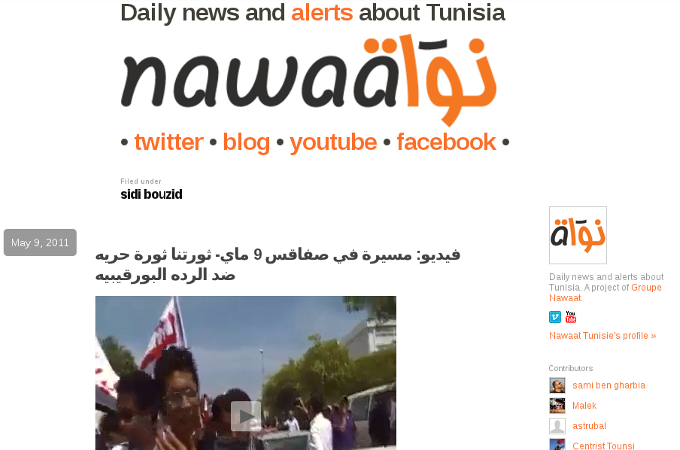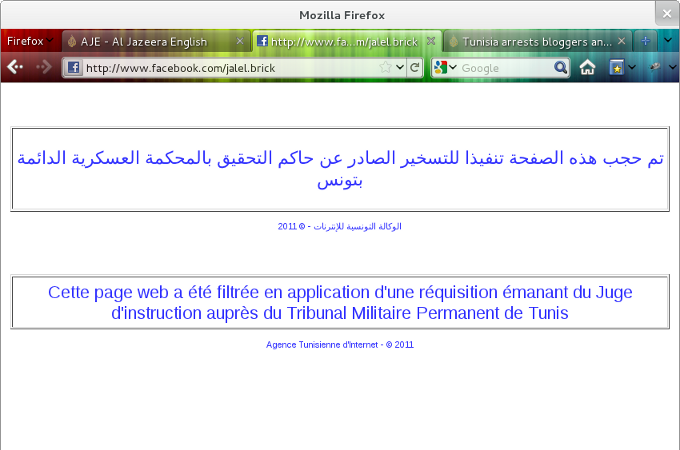Tunisia’s dissident blog stays true to form
Al Jazeera speaks with Nawaat co-founder, Riadh Guerfali, about citizen journalism in post-uprising Tunisia.

 |
| Riadh Guerfali, aka Astrubal, believes Tunisia is on the right track to democracy [Yasmine Ryan/Al Jazeera] |
Zine El Abidine Ben Ali’s regime may have been more-or-less ousted, but Tunisia’s leading dissident website is staying true to form in the country’s new era.
During the media blackout imposed as the uprising took hold of Tunisia in December and January, Nawaat.org [French/Arabic] was one of the most reliable sources of information, offering images and video showing what was happening on Tunisian streets.
In March, Nawaat was honoured with both the 2011 Netizen Prize from Reporters Without Borders and the Index on Censorship Media Award. But, despite all the buzz, its founders have not lost sight of their openly partisan, activist identity.
 |
| Nawaat was a leading voice in the dissident movement long before Ben Ali’s forced departure |
Last week, they refused to accept the Arab eContent Award 2011 (they won the eInclusion and Participation category), which is sponsored and hosted by the government of Bahrain.
“We reject this award in protest against the Bahrain’s internet filtering practices, the arrest of scores of bloggers and human rights activists and the arbitrary blocking of hundreds of websites and blogs that are critical of the Bahraini government and its ruling family,” Nawaat’s authors said in a statement[French/English], in a show of solidarity with Bahrain’s own protest movement.
Riadh Guerfali, who blogs under the pseudonym Astrubal, explained during an interview on a sunny afternoon in Doha, that Nawaat did not want to offer Bahrain’s rulers the kind of fig leaf that the international community had so often bestowed on Ben Ali.
“Fellow bloggers are being jailed and harassed. I think the minimum we can do is to decline this award,” he says.
“Sometimes international organisations do things that you can really not understand,” he says.
He points to the hosting of the World Summit on the Information Society (WSIS) in Tunisia in 2005, justified at the time as means of gently nudging Tunisia to change its repressive internet policies.
“But we know that it only serves to give them credit,” he says.
Nawaat may have caught the international media’s eye during Tunisia’s uprising, but it was around long before revolutionary fever was raging throughout the Arab world.
Established in 2004 – and blocked within Tunisia until the day before Ben Ali was forced from power, Nawaat helped fertilise the cyberterrain so that when the uprising finally came, dissident networks were in place to battle the censorship regime. Nawaat amplified the protesters’ voices, sending them echoing across the internet and beyond.
Yet in the aftermath of the uprising, Nawaat is no longer a “countermedia” outside the system. Now, it is an integral thread in the fabric of the new Tunisia, and its founders are facing the challenges this entails.
Guerfali tells Al Jazeera that Nawaat’s role in the transitional stage is a more ambiguous, nuanced part than it had played in the past.
“It’s going to be harder, because before it was very clear who the bad guys were, [and the] good guys,” he explains. “Now it’s a bit harder because we have to do our best to make sure the democratic process is on track.”
Certainly, Nawaat will play a key role continuing to defend the precious gains made in the realm of freedom of expression, he says.
With many other fruits of the uprising proving elusive, one of the most clear-cut victories to have been won with the toppling of Ben Ali was end of all internet censorship.
By February 5, activists had managed to lobby the government into unblocking all sites.
“For first time in Tunisia’s history, not a single site was blocked,” Guerfali says.
 |
|
Censorship makes a comeback – the ATI’s ‘legal’ note |
But in the past week, many Tunisians were shocked to learn that censorship was back, this time in a supposedly “legal” form.
The Tunisian Internet Agency (known as ATI under its French acronym), notorious for its heavy filtering under Ben Ali, has begun renewed censorship in recent days, this time under orders from a mysterious military court.
Not only have four Tunisians [French] had their Facebook pages blocked by the ATI, but they may be sentenced to up to three years in prison, in a previously unheard of application of a 1957 law against criticising the military.
On Wednesday, ATI director Moez Chakchouk argued in a briefing [French] with Tunisian journalists and bloggers that this blocking of individual URLs is filtering, not censorship – a euphemism few were willing to accept.
Guerfali, who taught law at the University of Perpignan until he was able to return from exile this year, is sceptical of the legality behind the military court’s order to block the pages.
“I would have understood if the decision had come from a civil court, but this is absurd,” he says, arguing that there needs to be a more transparent way for Tunisia to deal with defamation allegations.
“We fought very hard to have this free internet in Tunisia, and until this Facebook page was blocked, internet was 100 per cent free in Tunisia,” he says.
“We will be there to prevent such things.”
In another flashback to life under the old regime, 15 journalists were beaten in protests in downtown Tunis on May 6.
Guerfali says that such throwbacks are an inevitable part of the transition process, and that the important thing is for people to speak out in condemnation to make sure that impunity does not make a comeback.
“The difference is that now you can say ‘it’s absolutely unacceptable what has happened,'” he says.
Another duty Nawaat has taken on in this crucial juncture in the country’s history is to be a watchdog among fellow activists.
Slim Amamou, the blogger-turned-politician, has come in for particular scrutiny due to his high-profile role in the interim government. An outspoken cyberdissident during Ben Ali’s rule, Amamou was among the bloggers and web activists arrested in early January.
Within a matter of days, the former president fled the country, and Amamou was offered a post in the new government.
While others were ecstatic over the nomination, Nawaat was cautious from the beginning. They sent a clear message to Amamou on the day he was nominated, tweeting “Congratulations Slim, but we are watching you really closely.”
When it became clear that Amamou would be serving alongside those who had been members of Ben Ali’s government – before protesters forced their resignation – the blogger came in for particularly strong criticism from the activist community, including Nawaat.
“It was a bit hard to see Slim amongst those guys,” Guerfali says.
The secretary for state for youth and sports penned a blog post on Tuesday [French], admitting that he had tried to quit the government but had been convinced to stay.
“I have confidence in this government’s ability to organise free elections and that’s all I need,” he writes.
For Guerfali, Amamou deserves some credit in pushing for the end of pervasive internet censorship. But he adds that the activist community will be expecting to see concrete results from the 33-year-old blogger when the interim government hands over power in the coming months.
Despite all the challenges, Guerfali is adamant that, as long as Tunisians remain vigilant, there will be free and fair elections. Doubt has been cast as to whether the country will be ready to vote July 24, but he is optimistic.
He says that, while the chaos of the road to democracy might make some nostalgic for life under Ben Ali, even the threat of random acts of violence by those trying to undermine the democratic momentum should not be used as an excuse to turn back the clock.
“I prefer to die in a bombing than to die under the torture of a dictator or to live under the feet of a dictator,” he says emphatically.
In his eyes, the transitional period is essentially a power struggle, and it is crucial for the people to keep pushing their rights.
“Whatever happens, democracy is coming. We will not fall into the trap set by anyone who does not want democracy.”
Follow Yasmine Ryan on Twitter: @YasmineRyan